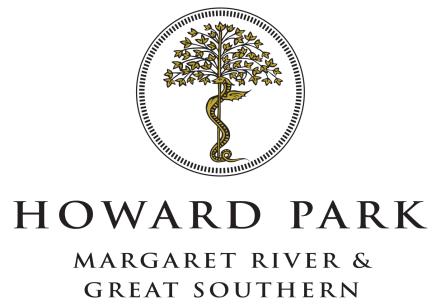Howard Park
Abercrombie Cabernet Sauvignon
Howard Park
Abercrombie Cabernet Sauvignon
Named for Walter Abercrombie, the much loved Great Grandfather and mentor of Jeff Burch, the owner of Howard Park Wines, this is Howard Park's finest Cabernet Sauvignon.
Howard Park’s winemaking philosophy is to craft elegant, age-worthy wines from our best sites in the Margaret River & Great Southern regions of Western Australia. Critical site selection, meticulous viticultural practice and detailed winemaking underline each Icon wine.
Wine Production
Harvest occurred from mid to late April 2017.
Small parcels were handpicked and sorted before fermentation.
Fermentation occurred in head down closed stainless and small, open vat steel fermenters. Selected parcels remained on skins post the fermentation to further enhance the tannin profile while others were pressed at dryness to capture fruit vibrancy.
Each batch was matured separately in order to build a wine history over time.
Barrel maturation: 22 months in 60% new and 40% older French oak barriques.
After a light egg white fining and filtration, the wine was bottled.
Tasting Notes
The bouquet of this wine is all perfume, poise and pleasure for the lover of fine Cabernet. Great depth and nuance, as the sweet and saintly violets meld with bush herbs as fresh red, blue and black fruits, gently simmer beneath the surface. Naturally the flavour and structure of the palate is no less exciting. A graphite mineral/savoury note gives a defined flavour and direction to start as rich berry fruits dominate the mid palate then succumb to supple, linear fruit tannins, cajoled by slick cocoa oak notes that complete the wine. This wine is an organoleptic extravaganza and will give great enjoyment for decades.
Named for Walter Abercrombie, the much loved Great Grandfather and mentor of Jeff Burch, the owner of Howard Park Wines, this is Howard Park's finest Cabernet Sauvignon.
Howard Park’s winemaking philosophy is to craft elegant, age-worthy wines from our best sites in the Margaret River & Great Southern regions of Western Australia. Critical site selection, meticulous viticultural practice and detailed winemaking underline each Icon wine.
Wine Production
Harvest occurred from mid to late April 2017.
Small parcels were handpicked and sorted before fermentation.
Fermentation occurred in head down closed stainless and small, open vat steel fermenters. Selected parcels remained on skins post the fermentation to further enhance the tannin profile while others were pressed at dryness to capture fruit vibrancy.
Each batch was matured separately in order to build a wine history over time.
Barrel maturation: 22 months in 60% new and 40% older French oak barriques.
After a light egg white fining and filtration, the wine was bottled.
Tasting Notes
The bouquet of this wine is all perfume, poise and pleasure for the lover of fine Cabernet. Great depth and nuance, as the sweet and saintly violets meld with bush herbs as fresh red, blue and black fruits, gently simmer beneath the surface. Naturally the flavour and structure of the palate is no less exciting. A graphite mineral/savoury note gives a defined flavour and direction to start as rich berry fruits dominate the mid palate then succumb to supple, linear fruit tannins, cajoled by slick cocoa oak notes that complete the wine. This wine is an organoleptic extravaganza and will give great enjoyment for decades.
Brand Materials
Vineyard & Production Info
Winemaking & Aging
Analytical Data
About the Vineyard
After a cold, wet winter/spring and annual rainfall above the averages of the past decade, the stage was set for a late start to vintage. Early spring growth was slow, and summer progressed in the same, mild fashion. Fungal diseases began to thrive in the humid, cool conditions and fruit selection and early harvesting was necessary to retain quality. By late March the heavens opened with an abundance of rain. As the mud dried, April delivered an Indian summer of unseasonably dry and warm conditions until the end of harvest. This prolonged ripening phase allowed flavours to develop fully and tannins to soften.





